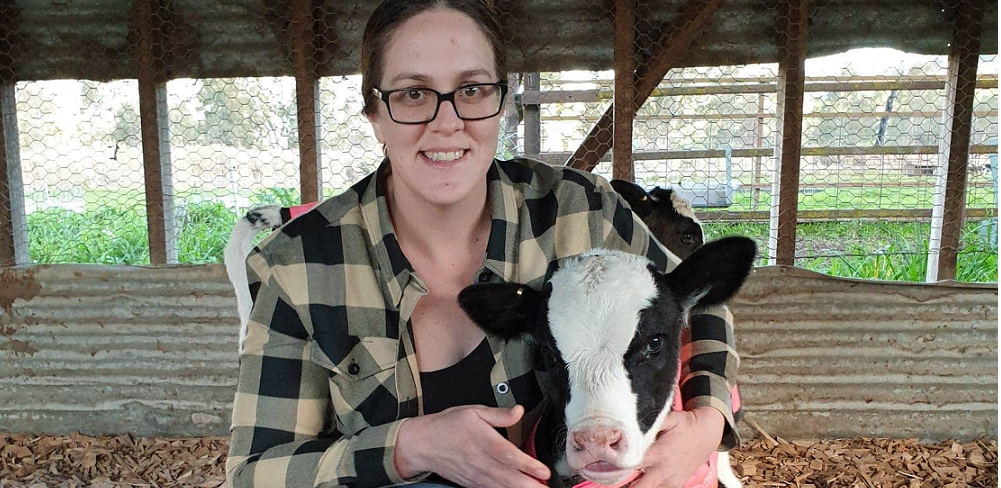When enrolled nurse Angela Dunstone moved from Canberra to her partner’s hometown Albury, not in her wildest dreams did she imagine changing her career to the dairy industry.
After four years of shift work at an Albury aged care facility, Angela felt disillusioned with her work-life balance.
“I wasn’t really enjoying myself; there was not much time to spend with my family or my partner,” she said. “I didn’t know what I wanted to do. I saw a job on Gumtree for a farmhand, with ‘no experience necessary’.”
Until landing the dairy farm job, Angela had never met a cow, so she definitely had ‘no experience’ and no idea what to expect.
“I had no farming background; it was a big learning curve to be milking, feeding, irrigating, fencing and spraying weeds,” she said.
Despite needing to leave Albury at 3.30am to start at 4.30am, Angela enjoyed the fresh air and variety of farm tasks. However, she felt “thrown into the deep end” when the farm manager left after six-months and the business was managed remotely.
“It was just at a time when I wanted to learn and know more,” Angela said.
Having completed a Certificate IV Agriculture at Wodonga TAFE, Angela learned as much as she could from the farm’s agronomist and veterinarian over the next two and a half years.
I wanted to learn more
While keen to stay in the industry, she eventually decided “it wasn’t worth the 45-minute drive on a dark, windy road” to work.
She asked her agronomist and vet contacts for advice on a dairy farm closer to Albury, and applied for work at Hermitage Dairy at Kergunyah South.
During her interview with fifth-generation farmer Stuart Crosthwaite, Angela emphasised her desire to learn: from the outset, it was obvious she had come to the right place.
“It was very structured,” Angela said. “I had basic knowledge but was self-taught, and Stuart guided me in the right direction.”
Fast forward nearly two years and Stuart, who is also founding chair of dairy cooperative Mountain Milk, continues to inspire and support Angela.
“Stuart is a great teacher with great knowledge that he is willing to share; he pushes me to learn and take on more responsibility,” Angela said.
I am valued and valuable
Angela is also grateful for Stuart’s inclusive style of leadership, recently asking his employees to establish a core set of values for the business. They developed a team charter that prioritised communication, teamwork and individual areas of responsibility. As a result, Stuart’s three employees were given specific work titles.
At first Angela was assistant pasture manager but that changed to assistant herd manager when Stuart recognised her interest in animal health.
“Each of us knows what jobs we have to do; if anyone has a question about the cows or animal health, they come to me. It gives me a sense of ownership in my area, and if I need advice I can ask Stuart,” Angela said.
“It makes me feel like I am valued and valuable to the business; I’m not just a number or just an employee, but I matter.”
Living in a farmhouse on the property with her partner, “who now drives 30 minutes to work in Wodonga”, Angela is eyeing a long future in the dairy industry.
She credited a diverse support network for helping to keep her in the industry, including Stuart and her colleagues, vets, genetic and calf-rearing specialists, agronomists, nutritionists and contractors.
“Good leadership and support networks are vital to attracting and retaining newcomers to the industry,” she said. “Without the support of a good team, staying in the industry and being successful would be so much harder.”
By Corinna Boldiston

